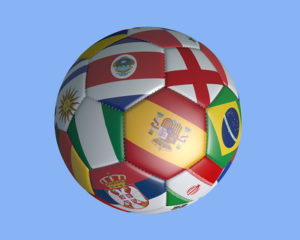 The World Cup is the pinnacle of international football competition, bringing together teams from the varying governing bodies that come under the auspices of the Fédération Internationale de Football Association (FIFA). The winning side gets to call itself the best footballing nation on the planet for at least four years, which is the point at which the tournaments gets underway again and a new champion is found.
The World Cup is the pinnacle of international football competition, bringing together teams from the varying governing bodies that come under the auspices of the Fédération Internationale de Football Association (FIFA). The winning side gets to call itself the best footballing nation on the planet for at least four years, which is the point at which the tournaments gets underway again and a new champion is found.
The hype around the World Cup has been huge almost since its inception, but certainly since the competition was re-started in the wake of the Second World War. It is under this understanding that crowds flock in the tens of thousands to watch matches play out, with the home nation understandably having more supporters there than other countries. The question is, just what sort of difference does this really make?
Quick Answer: How many host nations have won the FIFA World Cup?
There have been six winning hosts of the World Cup. Uruguay in 1930, Italy in 1934, England in 1966, West Germany in 1974, Argentina in 1978 and France in 1998.
There have been 21 World Cup Finals, meaning that 28.57% of host host nations have won the competition.
How Host Nations Have Performed
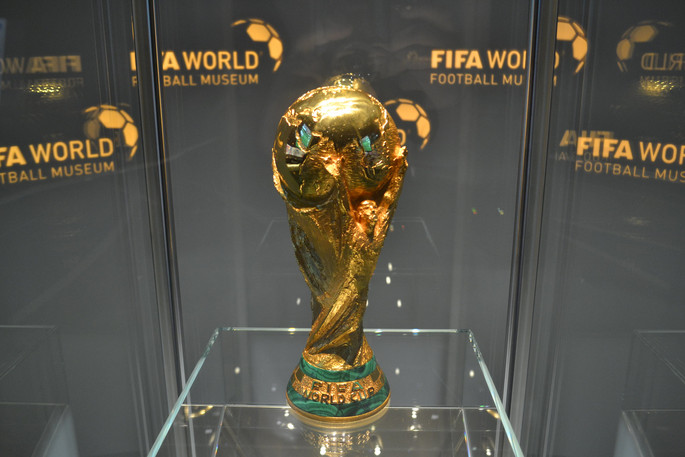
By Daniel, flickr
Later we’ll explore the manner in which a country is given the right to host the World Cup, but does it actually make a difference to a nation’s chance of success in the competition? Here is a table looking at which country hosted the World Cup in every year that the competition has taken place to date, as well as a look at how well they got on in the tournament itself:
FIFA World Cup Host’s Stage Of Elimination – 1930 to 2018
| Year | Host Nation | Stage Of Elimination |
|---|---|---|
| 1930 | Uruguay | Winners |
| 1934 | Italy | Winners |
| 1938 | France | Quarter-Finals |
| 1950 | Brazil | Runner-Up |
| 1954 | Switzerland | Quarter-Finals |
| 1958 | Sweden | Runner-up |
| 1962 | Chile | Semi-Finals (3rd) |
| 1966 | England | Winners |
| 1970 | Mexico | Quarter-Finals |
| 1974 | West Germany | Winners |
| 1978 | Argentina | Winners |
| 1982 | Spain | 2nd Group Stage |
| 1986 | Mexico | Quarter-Finals |
| 1990 | Italy | Semi-Finals (3rd) |
| 1994 | United States of America | Round Of 16 |
| 1998 | France | Winners |
| 2002 | Japan | Round Of 16 |
| South Korea | Semi-Finals (4th) | |
| 2006 | Germany | Semi-Finals (3rd) |
| 2010 | South Africa | Group Stage |
| 2014 | Brazil | Semi-Finals (4th) |
| 2018 | Russia | Quarter-Finals |
Over the course of the 21 World Cups that we have information on regarding the winner, the host nation was victorious six times. That is the equivalent of 28.57% of the tournaments that have seen the country hosting the matches go on to become the winners, or nearly one-third. Two other hosts have been losing finalists, whilst the hosts have only failed to make the knock-out stages on two occasions.
What that information seems to suggest, is that the host nation is often powered on by the support of the home crowd getting behind them. On top of that, the Football Associations of host countries will, perhaps, be supportive of their attempts to do well in the tournament. That is a notion that is borne out by the fact that some of the teams that have done well, such as Sweden and South Korea, are not ones you’d expect that from.
Choosing The Host Nation
Let’s look into the manner in which the host nation is chosen for the World Cup finals. It is a decision that has been the subject of some controversy in recent years, which will come to later on. Between the first World Cup in 1930 and the event taking place in 2018, seventeen countries have hosted the competition on at least one occasion with Brazil, France, Germany, Italy and Mexico each hosting on two occasions.
European Nations have hosted the most World Cups with eleven, followed by South America with five. North America has held three World Cups with Asia and Africa holding one each.
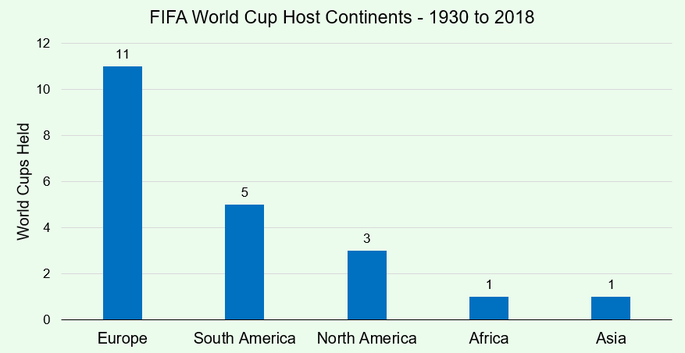
We know which countries have hosted the World Cup, let’s have a look at how the decision to award them the tournament was taken.
The Early Years Of Selections
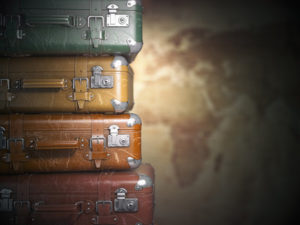 During the World Cup’s formative years, the awarding of the right to host the competition was decided during FIFA’s congress. Europe and South America were easily the two strongest areas for football, but for countries in one of them to get to the other required three weeks’ worth of travel by boat. When FIFA chose to award hosting duties to one, therefore, countries in the other would complain.
During the World Cup’s formative years, the awarding of the right to host the competition was decided during FIFA’s congress. Europe and South America were easily the two strongest areas for football, but for countries in one of them to get to the other required three weeks’ worth of travel by boat. When FIFA chose to award hosting duties to one, therefore, countries in the other would complain.
This can be seen in the fact that only four European nations travelled to Uruguay when it was awarded the hosting of the first ever World Cup in 1930. The 1934 iteration of the competition was hosted in Europe, with South American countries believing that it would alternate between continents every four years. When the 1938 tournament was awarded to France, therefore, Argentina and Uruguay both boycotted it.
That was the final year that the World Cup took place until after the Second World War, with FIFA deciding that, starting with the competition in 1958, the awarding of the hosting of the World Cup would alternate between Europe and the Americas. This was designed to help avoid controversy or potential boycotts. This method of shifting from one continent to the other continued until the 2002 World Cup, which we’ll come to in due course.
Moving To A Voting System
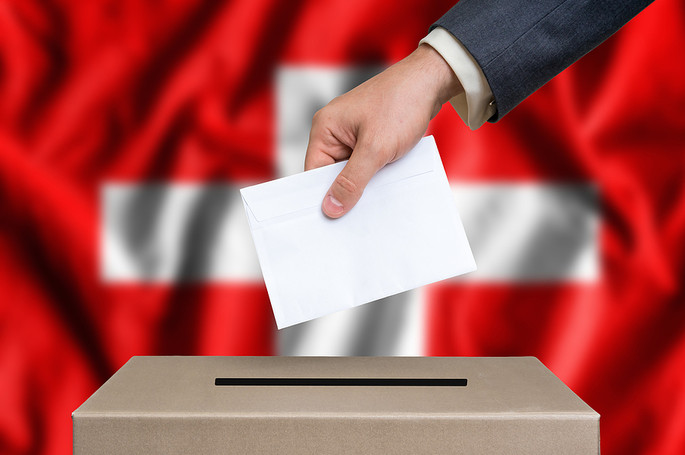
Given that the World Cup was intended to be a way of bringing countries together to celebrate football, the idea of some nations boycotting the tournament because of political reasons or a perceived slight was not something that FIFA wanted to be repeated. It was with this in mind that a decision was taken to chose the host nation by FIFA’s Council holding an exhaustive ballot.
For a time, FIFA would select the confederation that would host the World Cup and only countries from that confederation were able to apply for the right to do so. That was abandoned in the wake of South America being chosen in 2014. If a country wishes to host the World Cup then they apply to do so and are issued with a Hosting Agreement by FIFA, which explains what is expected of their bid.
The Selection Process
Once a country has officially put itself forward to be the host of the World Cup, a group of inspectors working on behalf of FIFA visit the country to see whether or not it meets the requirements of being a host. They then produce a report, which is sent to the FIFA Council members for their information on the bid. The decision on which country will be awarded the hosting duties is usually taken many years in advance.
The awarding of the host country as many as six or seven years ahead of the tournament taking place is taken in order to allow the hosts to do what is necessary to ensure that it will be ready for the arrival of hundreds of thousands of supporters for the competition. The likes of Russia and Qatar needed this time to finish the building of the stadiums that would host the football matches used for the competition.
Opening Up the Process
There have been a number of controversies around the awarded of hosting duties over the years, even when you move away from the early years of the tournament and the struggles between South American and Europe. The decision to pick a confederation that the host nation was chosen from, for example, came about in the wake of Germany being awarded hosting duties instead of South Africa in 2006.
The selection of the confederation was only done for the 2010 and 2014 World Cups, with the decision being taken to change that method from 2018 onwards. At the time of writing, the rule is that any country can apply to host the World Cup, unless their confederation hosted either of the two preceding World Cups. That is because Brazil was the only bidder in 2014 and there was a desire to avoid that situation happening again.
FIFA Bribery & Corruption
![]() In terms of controversies around the selection of World Cup hosts, few have rocked the world of football quite as much as those revealed in Andrew Jennings’ book Foul! The Secret World of FIFA: Bribes, Vote-Rigging and Ticket Scandals. It began a series of investigations into corruption in the sport’s governing body that eventually led to suggestions that the awarding of hosting duties hadn’t always been fair.
In terms of controversies around the selection of World Cup hosts, few have rocked the world of football quite as much as those revealed in Andrew Jennings’ book Foul! The Secret World of FIFA: Bribes, Vote-Rigging and Ticket Scandals. It began a series of investigations into corruption in the sport’s governing body that eventually led to suggestions that the awarding of hosting duties hadn’t always been fair.
A former head of the English Football Association, Lord Triesman, described the running of FIFA as being akin to ‘a mafia family’, with the President of the organisation, Sepp Blatter, the don. Triesman referred to ‘decades-long traditions of bribes, bungs and corruption’ that shocked the football world. On the eve of the 2015 FIFA Congress, US authorities undertook the arrest of senior FIFA officials.
The arrests were made in relation to the awarding of the hosting duties for the 2018 and 2022 World Cups, which were given to Russia and Qatar respectively. They came as a result of an FBI investigation that had lasted for at least three years, with authorities charging 14 officials. Of those 14, nine of them were current FIFA executives at the time, showing just how endemic corruption was in the organisation.
Whilst the 2018 and 2022 World Cups were the chief focus of the investigation, it was believed that other World Cups, including the awarding of the 2010 World Cup to South Africa, were also under suspicion. The awarding of the World Cup to Russia in 2018 and Qatar in 2022 was something that had been under a cloud of suspicion ever since it happened, so few were surprised when Swiss prosecutors opened criminal proceedings.
FIFA’s headquarters were raided, with ‘electronic data and documents’ seized as a result. Ten members of the FIFA Executive Committee, who took part in the vote to decide the countries that would be awarded the two World Cups, were questioned ‘on suspicion of criminal mismanagement’ as well as money laundering. The ‘scheme to enrich themselves through the corruption of international soccer’ had allegedly gone on for 24 years.
Despite the allegations of bribery and corruption as well as the arrests of those involved, the 2018 World Cup still took place in Russia and the 2022 version of the competition will be hosted by Qatar. The latter has been particularly controversial, especially in light of the country’s attitudes towards women and homosexuals. They may have paid bribes to be awarded hosting duties, but they didn’t have them removed as a result.
